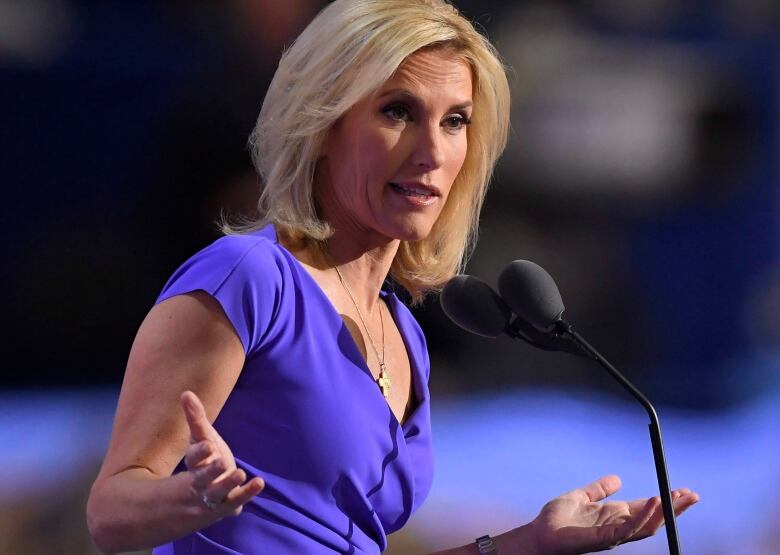Trump suffers political side-effects playing TV doctor during COVID-19 pandemic
Institutions in different countries issue warnings about medical ideas floated by the U.S. president

Warning: Speculating about medical cures on live television during a global pandemic may carry multiple unwanted side-effects.
Just ask U.S. President Donald Trump.
On Friday, institutions in different countries were issuing health warnings about different medical ideas the president of United States had shared with millions of television viewers.
The most attention-grabbing alert came from the British company that makes Lysol disinfectant products, which issued an obvious-sounding admonition: Don't inject yourself with Lysol.
"Under no circumstance should our disinfectant products be administered into the human body," said the statement from British company RB.
"[That includes] injection, ingestion or any other route."
The genesis of this medical warning was an offhand remark by Trump, which his staff says was twisted out of context, and which Trump himself now claims was meant sarcastically.
During Trump's daily news conference on Thursday, a U.S. official from the Department of Homeland Security made a routine announcement about lab tests indicating that sunlight and cleansing agents drastically weaken COVID-19 on surfaces.
Trump chimed in, suggesting maybe these things could be tested on humans. He talked about possibly hitting the body with a "tremendous" amount of light, and also proposed tests with injections.
He then quickly appeared to contradict himself.
A reporter asked whether the president was really talking about injecting people with bleach and Trump replied that he wasn't.
WATCH | Trump's comments about light and disinfectant:
And that's the exchange that launched hundreds of embarrassing headlines around the world, in a variety of languages. French TV networks, for example, called it "mind-blowing," and suggested the president was telling people to inject disinfectant.
The office of Maryland's Republican governor, Larry Hogan, issued a public alert, after the state received more than 100 calls from people inquiring about ingesting disinfectants to combat COVID-19.
We decided to take the step of posting this alert after receiving more than 100 calls to our hotline.
—@riccimikeA horrified British doctor called it "absolutely dangerous, crazy," and likely lethal.
But a White House spokesperson pushed back on the reporting. "Leave it to the media to irresponsibly take President Trump out of context and run with negative headlines," said Kayleigh McEnany.
It was just her latest entanglement with the press this week. She also blasted a reporter for not addressing Trump as the "president," which drew reminders that she herself wasn't especially courteous to Trump's predecessor.
Now, about that malaria drug
Warnings emanated from inside the administration about another potential medical solution floated by the president.
The U.S. Food And Drug Administration advised against the use of hydroxychloroquine, the malaria drug Trump spent weeks touting as a possible game-changer in the fight against COVID-19.
It released a statement saying hydroxychloroquine, which also treats lupus and rheumatoid arthritis, can cause heart and kidney problems, increase insulin levels, and raise the risk of severe hypoglycemia.
The FDA said it reviewed case reports and found no proof the drug works against COVID-19. Given the side-effects, it said use of the pill should be limited to clinical trial settings or for certain hospitalized patients.
The president's backers point out that there's some nuance here.
Early studies are contradictory. And when discussing the drug, Trump put up some caveats, too. He repeatedly mentioned the possible side-effects of hydroxychloroquine, even as he was promoting its use during his news conferences.

However, for weeks, he and an entire ecosystem of supporters touted this cheap generic medicine as a possible solution to the COVID-19 crisis.
Fox News played a significant role.
A devoted Fox News viewer, the president would have seen frequent appearances by celebrity doctor Mehmet Oz and segments from Fox host Laura Ingraham talking up hydroxychloroquine.
But those television personalities didn't just promote the drug on the air: they both personally spoke with administration members about the issue.

Ingraham met with Trump to discuss it, The Washington Post reported. Oz even spoke on-air about how he discussed hydroxychloroquine with senior U.S. health official Seema Verma.
Now, a U.S. study conducted among veterans suggests the drug offers no benefit against COVID-19 — and might be likelier to harm people.
A French study drew similar conclusions. The National Institute of Allergy and Infectious Diseases, led by Dr. Anthony Fauci, issued guidelines that say there are no proven drugs for treating COVID-19.
This week, a U.S. federal official said he was ousted from his senior role in the Department of Health and Human Services for resisting Trump's promotion of hydroxychloroquine.
The fact is, the hydroxychloroquine research is still at an early stage. Some studies have suggested it might act as an anti-viral agent.
Ingraham this week again defended the drug and pointed to methodological shortcomings in the new U.S. study.
A member of the Trump cabinet also warned against drawing conclusions. Veterans Affairs Secretary Robert Wilkie said the U.S. study, conducted in conjunction with his department, is not a definitive conclusion. He called it a non-clinical study, involving a small number of veterans in the last stages of life.
'Limit the mistakes you're making'
As for Trump's daily televised event, Republican strategist Matt Mackowiak said it's understandable why the president views them as useful.
He said the president can communicate directly with voters, around a media filter that sometimes distorts his message.
But still, said the strategist, stricter message discipline might help.
Instead of the freewheeling daily event, he said Trump would be better off doing a brief announcement, then turning the event over to experts.
"Get your message out there. And also limit the mistakes you're making," he told CBC News.
"Do … five or 10 minutes at the beginning, then do the substance, then evacuate."
Which is what happened Friday. A day after the bleach-injection musings, Trump and his team held their shortest coronavirus briefing ever, and the week ended without a fresh controversy.
With a file from Katie Simpson



